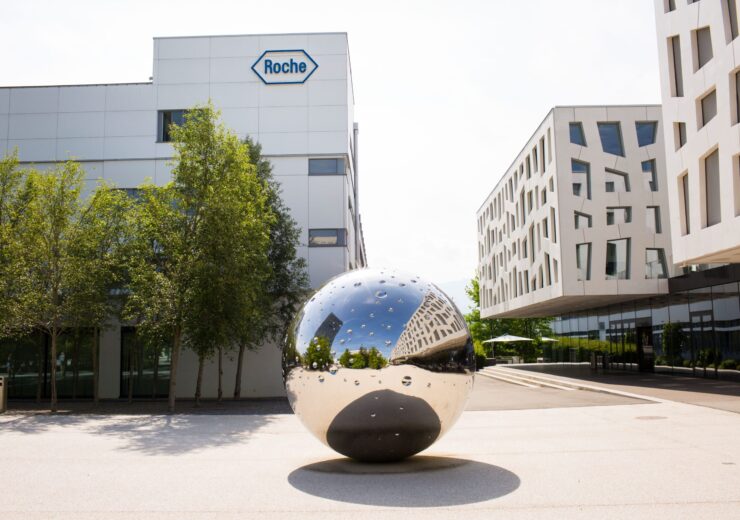According to the long-term data, around 60% of people getting Vabysmo in BALATON and up to 48% of people in COMINO study extended their treatment intervals to three or four months apart

An image of Roche’s logo on building. (Credit: F. Hoffmann-La Roche Ltd)
Roche said that new long-term data of its Vabysmo (faricimab) has demonstrated maintained vision gains and robust retinal drying in two Phase 3 trials of patients with certain retinal vein occlusion (RVO).
Vabysmo is a bispecific antibody that targets and stops two signalling pathways related to several vision-threatening retinal conditions.
The two global late-stage trials, BALATON and COMINO, assessed Vabysmo in macular oedema due to branch and central retinal vein occlusion (BRVO and CRVO).
Both randomised, multicentre, double-masked, global trials compared the efficacy and safety of Vabysmo to aflibercept.
BALATON enrolled 553 BRVO patients whereas COMINO enrolled 729 CRVO patients.
During the trial, the patients were randomised to receive monthly injections of either Vabysmo or aflibercept for the first 20 weeks.
From weeks 24 to 72, all participants were administered the antibody up to every four months, following a treat-and-extend dosing regimen.
The primary endpoint for both trials was the 24-week change in best-corrected visual acuity (BCVA) from baseline.
From baseline to week 24, changes in central subfield thickness (CST) and retinal fluid drying were secondary endpoints for both trials.
For weeks 24 to 72, the secondary endpoints changed to the percentage of patients on treat-and-extend intervals, the change in CST from baseline, and the BCVA change from baseline.
According to the long-term data, around 60% of people getting Vabysmo in BALATON and up to 48% of people in the COMINO study extended their treatment intervals to three or four months apart.
The findings show a significant increase compared to the typical one to two months for current RVO treatments.
Additionally, patients achieved vision gains and robust retinal drying in the first 24 weeks of the studies for over one year.
Faricimab was also well tolerated, and its safety profile was consistent with previous trials.
Overall, the findings demonstrated that the reductions in retinal fluid and improvements in vision attained during the first 24 weeks of the research persisted for 72 weeks.
Roche chief medical officer and global product development head Levi Garraway said: “This is the first time that vision and anatomical improvements have been maintained for more than a year in global Phase 3 studies for both branch and central retinal vein occlusion.”
In October 2023, the US Food and Drug Administration approved Vabysmo to treat macular oedema following RVO.
